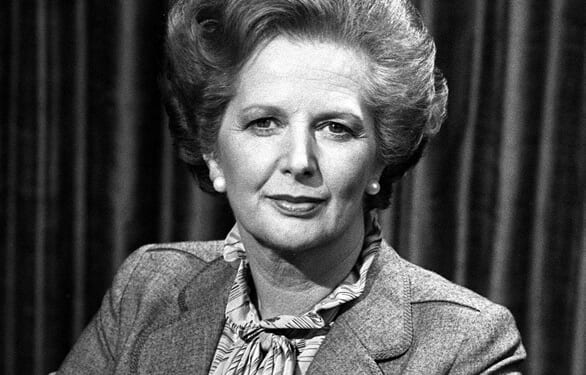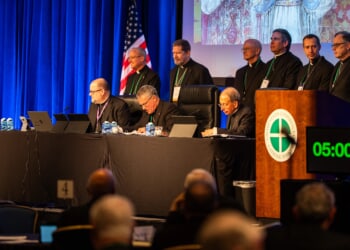John Wall is a retired engineer and former Conservative county councillor in Hampshire.
Margaret Hilda Roberts was born 100 years ago today, on 13 October 1925, in Grantham
Looking at Westminster I’m underwhelmed, where are the towering figures? As we celebrate the centenary of her birth today, Margaret Thatcher stands out.
If you can remember the sixties, you weren’t there. I can, and was, but the seventies were my formative years.
It was a somewhat grey period and can be revisited through archive TV channels. Film and TV productions in need of an exterior location might use Docklands, then a decaying post-industrial landscape, and Britain was often the butt of jokes.
In addition to the oil crisis there seemed to be interminable strikes with beer and sandwiches at No.10.
When you’re young a three-day week and power cuts can be fun, until you miss your favourite TV in an era before catchup.
Margaret Thatcher spanned generational changes. She was first elected in 1959 when Macmillan secured a 100 seat majority.
Anoraks will note the closeness in age between Wilson (b. 11 March 1916), Heath (b. 9 July 1916) and JFK (b. 29 May 1917). They were, like Thatcher – who was almost fourteen when WW2 started – part of the wartime, greatest, generation.
JFK succeeded Eisenhower (b. 14 October 1890) in 1961, Wilson became LOTO in 1963 and PM in 1964, replacing Home (b. 2 July 1903) who’d succeeded Macmillan (b. 10 February 1894). Heath became LOTO in 1965. All of a generation.
Three decades later she was succeeded by Major (b. 29 March 1943) in 1990, while George H.W. Bush (b. 12 June 1924) was replaced by Clinton (b. 19 August 1946) in 1993.
Issues Thatcher would have to address when PM were already present in 1959.
Despite Macmillan’s “never had it so good”, Suez had shown that Britain wasn’t a Great Power any more and the retreat from Empire was underway. Some of it was effectively a vanity project, acquired when Britain was wealthy, but unaffordable when the costs outweighed the benefits and it had to be defended.
I doubt I was unique in seeing Mick Lynch as the reincarnation of Fred Kite from 1959’s film “I’m all right Jack”, and whose character was based on late 1950s trades unionists.
During her two decades in parliament before becoming PM union militancy was endemic, and which the 1969 Castle/Wilson ”In Place of Strife” sought to address. Those interested in irony will note that cabinet opposition was led by Callaghan, while the less said about Heath and the unions the better!
Although often hailed by lefties Attlee’s legacy has problems.
The Beveridge Report was widely supported and healthcare free at the point of delivery is a good concept, but it’s unlikely the NHS was ever “the envy of the world” as its structure hasn’t been copied. Towards the end of her term Thatcher introduced the National Health Service and Community Care Act 1990 to provide an internal market, a positive step, but three and a half decades later the NHS is a black hole that swallows any taxpayers’ money available, while other countries deliver equivalent care for less of GDP – or better for the same.
The welfare state is another basically good idea and she sought to reduce the dependency culture, but more and more people now receive benefits and the cost is spiralling.
The current situation in both health and welfare may have been better had Thatcher’s philosophies persisted.
Fundamentally, ‘it’s the economy, stupid‘, but Attlee took the wrong lesson from WW2; state direction rather than control, telling industry what to achieve not how to achieve it, was key.
This isn’t to argue that nationalisation is wrong per se, few railways nowadays aren’t state run and subsidised, but like Starmer et al, Attlee didn’t understand business.
Business aims to make profits which can be reinvested to maintain profitability.
Political priorities tend to be short-term and vote-driven. A profitable area can be used to subsidise a loss-maker that should be closed, but over time the former becomes uncompetitive, requiring subsidies, while the latter continues to need subsidies – a double whammy!
When employment is the priority, modernisation, particularly involving reducing headcount, becomes difficult and by the 1970s many nationalised industries were overmanned, strike-riven and uncompetitive – and also the butt of jokes.
By 1979, after a Winter of Discontent, the settlement was long broken.
Margaret Thatcher, the last opposition leader to win power with previous government experience, stepped forward.
As a teenager in Britain’s darkest hour she saw Churchill’s resolve, two decades later she was in parliament with him and after another two decades was PM.
Although she sometimes compromised and bided her time (not taking on the miners until her second term), her resolve, together with a strong moral compass (then shared across much of the political spectrum), served Britain well.
Margaret Thatcher probably wouldn’t be right for today, but when I think of the political pigmy now in No.10, I long for someone determined to put the Great back into Britain.
Are there still titans?

















